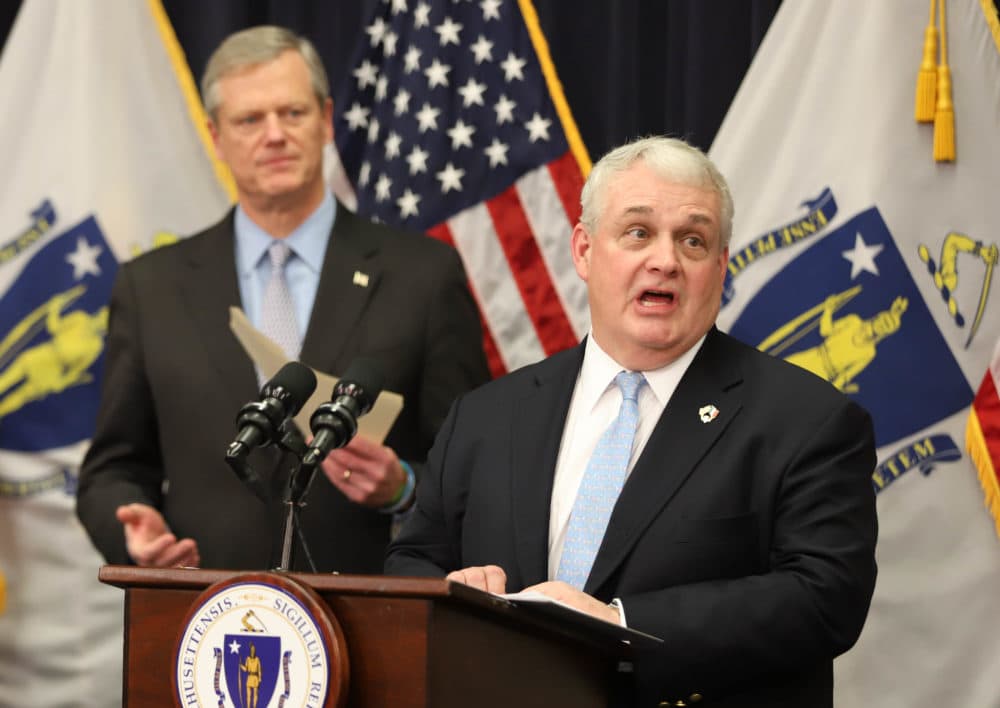Advertisement
Gov’s Budget Would Push Spending Up To $44.6 Billion

With the $44.6 billion fiscal 2021 budget his administration unveiled Wednesday, Gov. Charlie Baker said Massachusetts would be able to fully fund both the letter and spirit of the new education funding law, make sizeable investments in public transit and workforce training, and still stash more money away for an eventual economic downturn.
The central themes of the Baker administration's sixth budget are education and transportation, Administration and Finance Secretary Michael Heffernan said.
Public schools would see $355 million in new spending — the first payment toward a $1.5 billion, seven-year overhaul of the state's public education funding formula — and the budget newly directs $216.7 million to the MBTA and other transportation agencies to address safety and infrastructure issues.
Baker's budget was built on the consensus agreement of his administration and lawmakers that the state will collect an estimated $31.15 billion in tax revenue during fiscal 2021 — 2.8% growth, modest compared to recent years of higher-than-expected collections that resulted in large surpluses.
The governor's budget would increase overall state spending by 2.3% above the current fiscal year, according to the administration, and accounts for a $96 million reduction in tax revenue associated with the income tax rate having dropped to 5%, a reduction of $95 million because of the state's new restrictions on the sales of vaping products, and another $64 million reduction from the scheduled re-emergence of a charitable giving tax deduction.
Baker's spending plan assumes the state will pull in $282.7 million in revenue from casino gaming, $146 million in marijuana taxes and another $14 million from Cannabis Control Commission license payments and fines.
It also assumes $35 million in revenue from an activity that is still illegal in Massachusetts — sports betting — another $16 million from an opioid tax the governor has asked the Legislature to approve, and the $237 million in one-time revenue that would materialize if the Legislature goes along with the governor's sales tax modernization plan.
The budget plan includes $237 million in one-time revenues associated with a two-phase plan to begin collecting sales taxes from certain companies in real-time or at least on an accelerated basis, similar to a plan the administration has previously attempted to get the Legislature to adopt.
Currently, sales taxes paid by consumers at the point of sale are held by businesses and remitted to the state on a monthly basis by the 20th day of the month after the taxes were collected. Heffernan said the system stems from "the days of paper checks and manual cash registers."
Advertisement
In the first phase of the Baker administration's plan, the largest 10% of businesses — those with at least $100,000 in sales or room occupancy and meals tax collections — would be required to remit taxes from the first three weeks of each month in the final week of that same month. The final week's remittance and reconciliation of any discrepancy would take place the following month.
Heffernan said phase one would affect 10% of businesses but account for 80% of sales tax revenue. The second phase would take effect in mid-2023 and require "all retailers and credit card processors [to] capture sales tax from electronic transactions at the moment of purchase and remit daily," the secretary said.
The administration's spending plan also controls cost growth at MassHealth, the state-run Medicaid program that serves 1.86 million residents and has grown to consume about 40% of state spending. Baker proposed funding the program at $16.772 billion gross, a 0.6% increase over FY20.
Elsewhere in the budget, Baker's administration proposes:
- a $310 million deposit to the state's Stabilization Fund
- an additional $27.1 million for the Department of Children and Families to help reduce caseloads for social workers and promote adoptions
- an increase of $47.5 million or 17% for addiction treatment services across multiple agencies
- a spending increase of $41.3 million or 2% for the Department of Developmental Services
- $5.7 million to support a class of State Police recruits expected to begin at the academy during FY21
- $19.7 million across departments to implement the recent criminal justice reform law, and a new employer tax credit worth up to $2,000 for each person with a disability hired and who works 18 consecutive months.
The House and Senate will redraft Baker's spending blueprint in April and May, with each branch's Ways and Means Committee presenting its own vision for fiscal 2021 spending. The new fiscal year starts July 1.
This article was originally published on January 22, 2020.